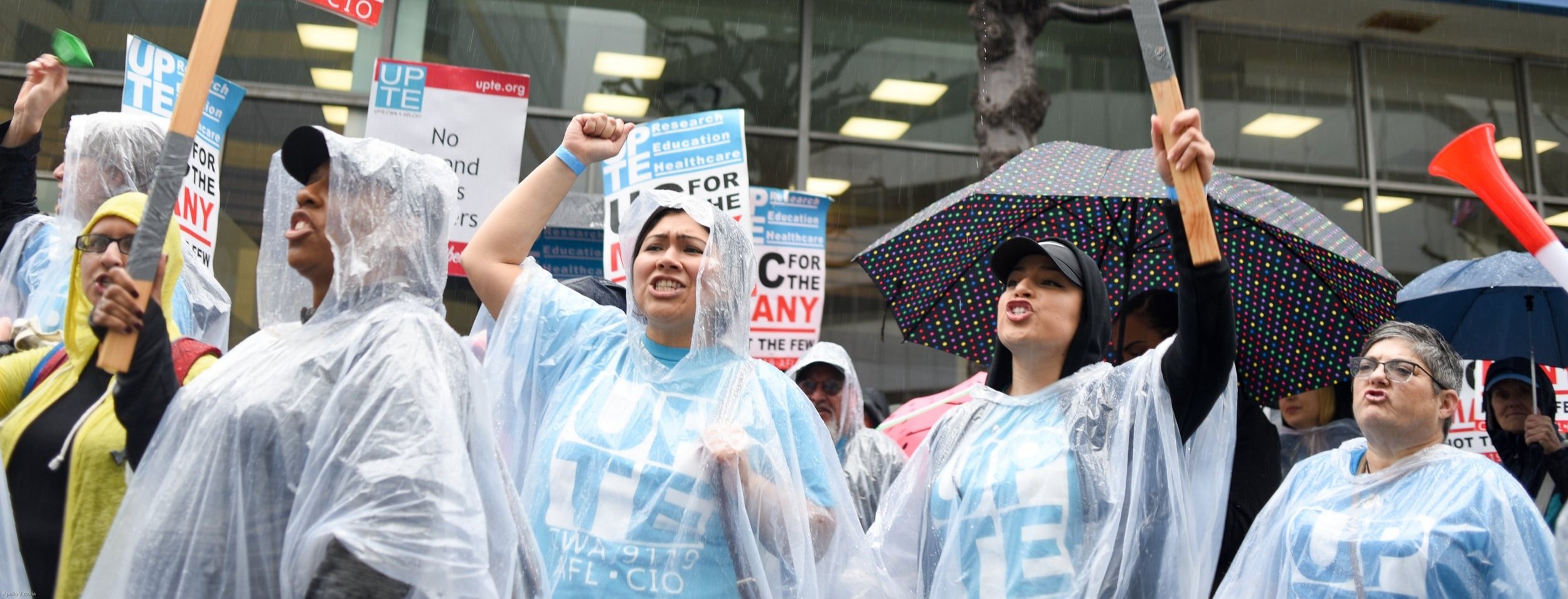

Safe staffing saves animal lives
UC Davis’ William R. Pritchard Veterinary Medical Teaching Hospital—ranked the country’s top animal hospital—should be a place where every cat, dog, horse, or bird receives world‑class care. Yet due to a severe recruitment and retention crisis, the hospital’s animal health technicians and animal technologists often cannot give animals—or their worried human companions—the attention they deserve.
Staffed by University Professional and Technical Employees CWA Local 9119 (UPTE CWA 9119) professionals, UC Davis’ Veterinary Medical Teaching Hospital (VMTH) treats more than 50,000 animals a year—from household pets to horses, livestock, and exotics—while offering 24/7 emergency care. Yet, regional specialty and emergency clinics now pay up to $15 per hour more, making it challenging for VMTH to hire and retain talent. Key areas, such as the Small Animal ICU and Recovery Ward, often have only two technicians for over sixty patients; emergencies are turned away, and staff report preventable tragedies.
Burned‑out technicians say they wouldn’t board their own pets overnight. While still delivering skilled, compassionate care, workers are urging management to reduce turnover, expedite hiring, establish equitable salaries and career paths, and implement differential pay for weekends and holidays to stabilize staffing.
"When I have a high caseload, even if they aren't particularly critical cases or ones that need a lot of care, it's just really hard to keep up. You want to be able to make sure that you're catching all of the little things with each individual patient, because it's so crucial that we chart everything. It's really difficult to keep up with the charting, the feeding, and making sure that you're catching anything unusual when you have such a large patient load. Even though this is an animal veterinary hospital, it is very much still a hospital, and my department is still very much an ICU. And so it would be really beneficial if we were able to get more support from the hospital to support us in this high-level, high-intensity critical care role.”
Gemma Blumenshine
Animal Health Technician 3, VMTH
UPTE Workplace Representative, UC Davis
Why you should care about safe staffing levels at UC Davis’ Veterinary Medical Teaching Hospital (VMTH):
-
Pay and benefits have fallen behind.
Then: Competitive salaries and robust benefits attracted—and kept—top‑tier technicians.
Now: Regional specialty and emergency clinics pay $10–$15 more per hour.
Workloads have become unsustainable.
Then: Reasonable caseloads let techs focus on each animal.
Now: A single Emergency Room technician may care for sixteen patients per shift, compared with about three at comparable hospitals.
Retention has cratered.
Then: Skilled technicians often stayed tenyears or more.
Now: Most new hires leave in under two years, and seasoned staff are moving to higher‑paying employers like Veterinary Emergency Group, an emergency veterinarian service in Elk Grove.
Experience levels are dropping.
Chronic vacancies force the hospital to hire very recent graduates who need extensive on‑the‑job training—adding even more pressure to the few senior technicians who remain.
-
Emergency closures: The Small Animal Intensive Care Unit (ICU) occasionally shuts its doors due to a lack of staff, forcing families who have driven hours for help to seek care elsewhere.
Rushed care: On some weekend night shifts, two technicians may be responsible for sixty recovering animals—leaving roughly thirty seconds per patient for basic treatments. Critically ill pets can be overlooked, and at least one animal has died as a result.
Specialty delays: Services such as Radiation Oncology, Orthopedic Surgery, and Internal Medicine struggle to hire experienced staff, resulting in delays of life-saving procedures.
Large-animal impact: Horses and livestock require constant monitoring; without enough staff, even the most dedicated technicians admit they would hesitate to board their own animals overnight.
Human toll: Exhausted technicians face emotional burnout and physical strain, leading to increased turnover and erosion of the hospital’s teaching mission for future veterinarians.
When skilled hands are missing, every patient’s recovery slows, costs climb, and worried human companions lose peace of mind.
-
Set safe staffing ratios. Match the number of technicians on duty to the number and needs of patients, as pediatric and human ICUs already do.
Pay market‑rate wages and honor experience. Bring salaries and benefits in line with comparable emergency and specialty hospitals, and reward technicians who have dedicated a decade or more to UC Davis.
Hire for skill, not just the lowest cost. Offer mid‑scale or higher pay steps to attract seasoned professionals who can train students and new graduates.
Invest in retention. Provide ongoing continuing education funds and pathways for career growth, so that the best technicians build their futures—and our pets’ futures—here.
World‑class veterinary medicine depends on skilled, stable teams. By treating our technicians as the professionals they are, UC Davis can once again set the gold standard—for the good of every animal that passes through its doors and for the families who love them.


